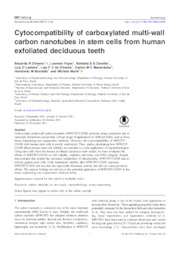Cytocompatibility of carboxylated multi-wall carbon nanotubes in stem cells from human exfoliated deciduous teeth.
Cytocompatibility of carboxylated multi-wall carbon nanotubes in stem cells from human exfoliated deciduous teeth.
Author(s): OLIVEIRA, E. R.; FAYER, L.; ZANETTE, R. S. S.; LADEIRA, L. O.; OLIVEIRA, L. F. C. de; MARANDUBA, C. M. C.; BRANDAO, H. de M.; MUNK, M.
Summary: Carboxylated Multi-wall Carbon Nanotube (MWCNT-COOH) presents unique properties due to nanoscale dimensions and permits a broad range of applications in different fields, such as bone tissue engineering and regenerative medicine. However, the cytocompatibility of MWCNT-COOH with human stem cells is poorly understood. Thus, studies elucidating how MWCNT-COOH affects human stem cell viability are essential to a safer application of nanotechnologies. Using stem cells from the human exfoliated deciduous teeth model, we have evaluated the effects of MWCNT-COOH on cell viability, oxidative cell stress, and DNA integrity. Results demonstrated that despite the decreased metabolism of mitochondria, MWCNT-COOH had no toxicity against stem cells. Cells maintained viability after MWCNT-COOH exposure. MWCNTCOOH did not alter the superoxide dismutase activity and did not cause genotoxic effects. The present findings are relevant to the potential application of MWCNT-COOH in the tissue engineering and regenerative medicine fields.
Publication year: 2022
Types of publication: Journal article
Unit: Embrapa Dairy Cattle
Keywords: Carbono, Células-tronco, Engenharia de tecido, Estudo in vitro, Nanotecnologia
Observation
Some of Embrapa's publications are published as ePub files. To read them, use or download one of the following free software options to your computer or mobile device. Android: Google Play Books; IOS: iBooks; Windows and Linux: Calibre.
Access other publications
Access the Agricultural Research Database (BDPA) to consult Embrapa's full library collection and records.
Visit Embrapa Bookstore to purchase books and other publications sold by Embrapa.

